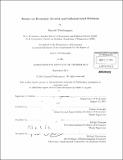Essays on economic growth and informational frictions
Author(s)
Pienknagura, Samuel (Samuel Jaime)
DownloadFull printable version (37.23Mb)
Other Contributors
Massachusetts Institute of Technology. Dept. of Economics.
Advisor
Daron Acemoglu and Abhijit Banerjee.
Terms of use
Metadata
Show full item recordAbstract
This thesis consists of three chapters on Economic Growth and Informational Frictions. Chapter 1 investigates the relation between financial development, R&D expenditure and aggregate growth. It provides empirical evidence that financial development has a large positive effect on both growth and R&D, and that the effect of financial development on growth is likely to be explained by its effect on R&D. I also study a general equilibrium model in with predictions which are consistent with the empirical regularities mentioned above. In particular, aggregate growth increases as financial development increases. The model also predicts that financial development produces large welfare gains, specially at low levels of financial development. Finally I show that the model studied suggests that R&D policy is welfare improving and that policy should be conditional on the level of financial development. Chapter 2 gives an empirical assessment of the world income distribution. In particular, I take a CES production function implied by a Skill-Biased technical change model and fit this production function to the data. The calibration results give evidence of the importance of including different skills to account for the observed income differences over time. I also show that the calibration exercise is validated by the estimated values of the parameters of the model. In Chapter 3 I study a model of entry under uncertainty. In particular, I analyze an economy where potential entrants make entry decisions after receiving noisy signals of the true demand levels for the different sectors of the economy. I show that equilibrium strategies depend on the precision of the signals received by agents. When precision is low the equilibrium of the game is a pure strategy equilibrium where agents enter the sector for which they receive a higher signal. On the other hand when precision is high the optimal strategy is to randomize over which sector to enter. The model also highlights the non-monotonic relations between the discrepancy between the equilibrium and efficient entry levels and both the precision of the signal and the true relative demand between sectors.
Description
Thesis (Ph. D.)--Massachusetts Institute of Technology, Dept. of Economics, 2011. Cataloged from PDF version of thesis. Includes bibliographical references.
Date issued
2011Department
Massachusetts Institute of Technology. Department of EconomicsPublisher
Massachusetts Institute of Technology
Keywords
Economics.